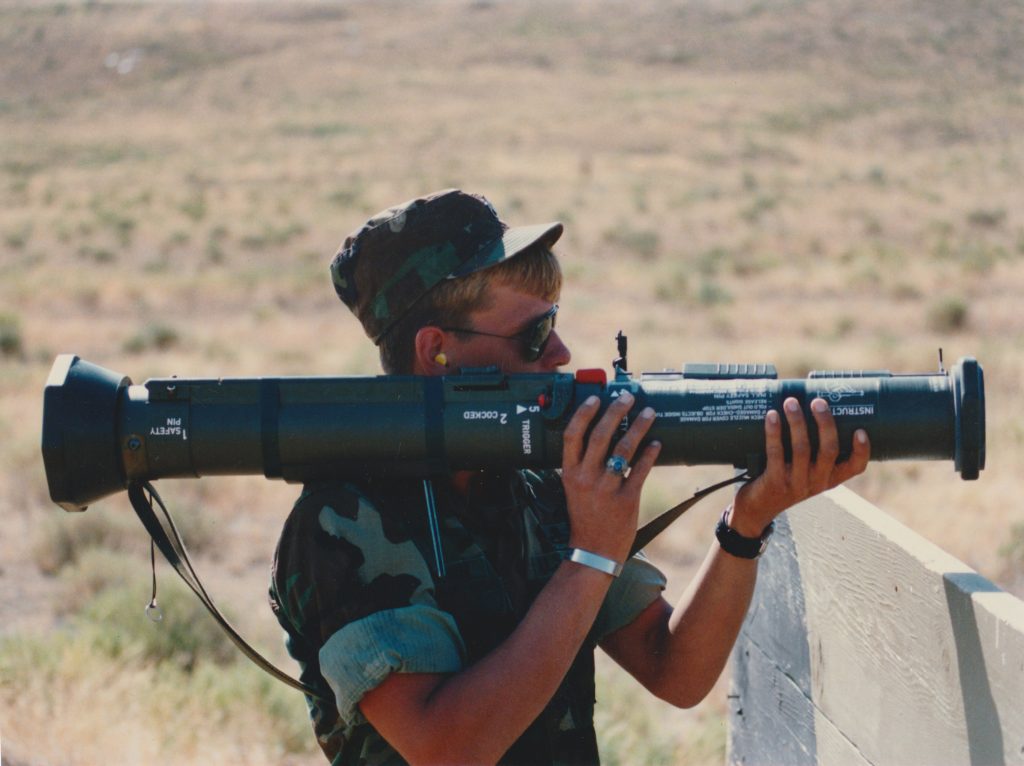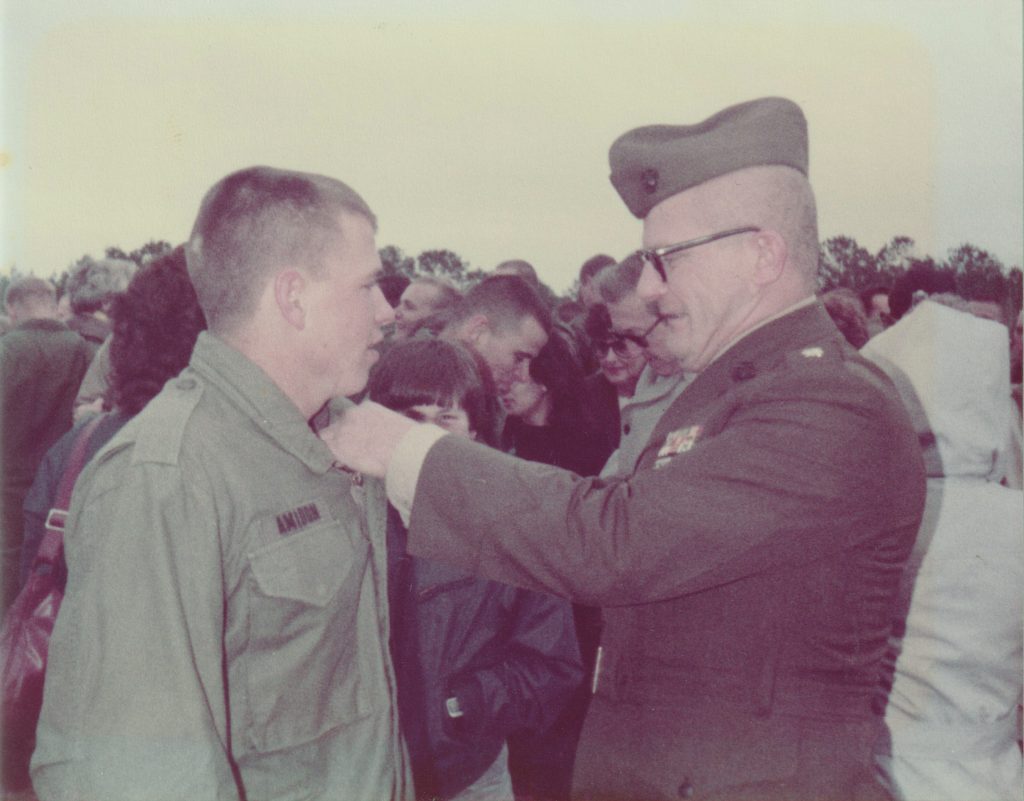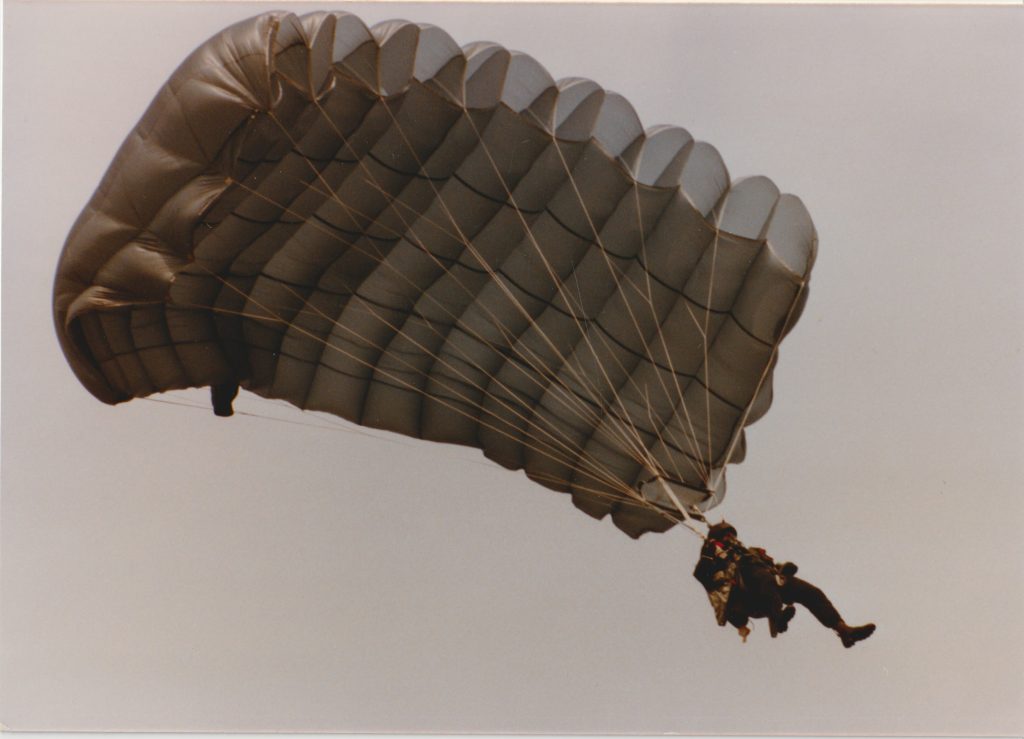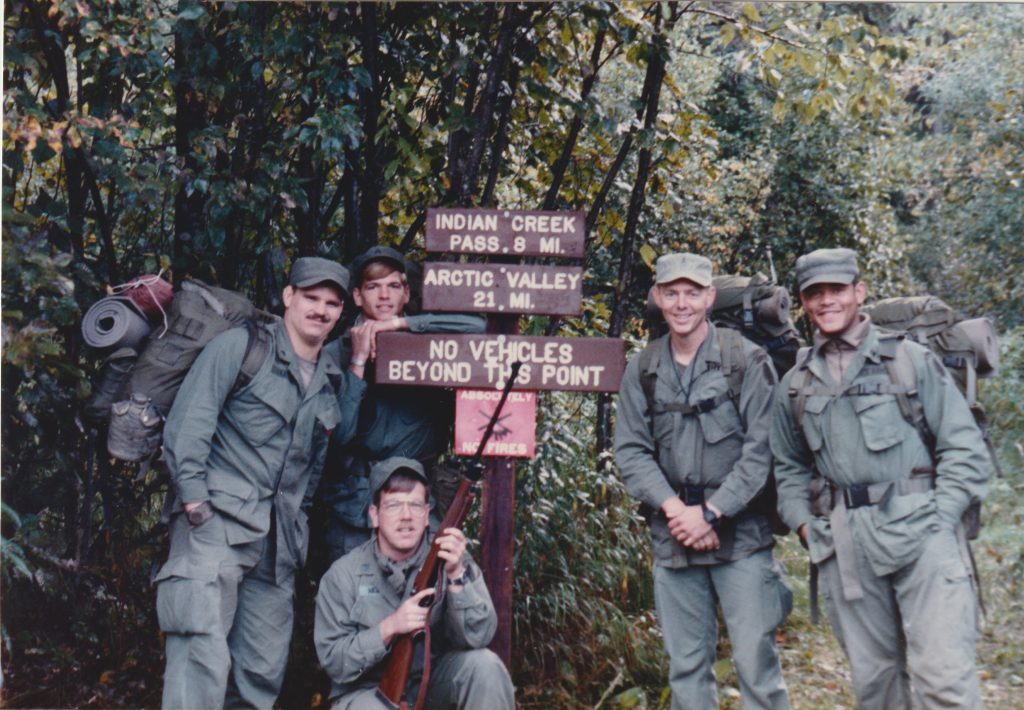Retired US Army Major Tom Amidon is most proud of the cadets he trained and mentored for battle across the globe
On November 11, 2020—Veterans Day—Tom Amidon awakens to a familiar blend of thoughts and emotions, rooted in his remembrances of those who have served. Today, he will reminisce with fellow co-workers during a special event at Oak Ridge Associated Universities (ORAU), a consortium focused on science, education, security, and health, where Amidon serves as Director of Safeguards and Security.
At the appointed hour, the man with a modest mustache and graying hair—the result of wisdom gained from advancing to Sergeant First Class in the US Army Special Forces, and later retiring as a Major in the Army Intelligence Corps—moves his cursor to the all-too-familiar “Join Meeting” button on his computer screen.

When his turn comes to speak, Amidon, wearing his dress uniform, looks at his notes and then up at the tiny camera atop his screen. “Good afternoon,” he says. “I was going to speak today about sacrifice, but to be honest, at 18 years old, I was not thinking about sacrifice. I was thinking about service. I just never considered what that service may cost. So today, rather than say sacrifice, I will talk about what many veterans lost…”
His childhood leading to his enlistment in October 1982 sounds a bit like a Hollywood script. He was one of six children to a Marine dad growing up in Havelock, North Carolina, just off Marine Corps Air Station Cherry Point. The base was home to the 2nd Marine Aircraft Wing and Fleet Readiness, where Amidon’s father, Alton, a Vietnam veteran, served as a lieutenant colonel.
Amidon’s mother, Claire, shuttled the kids to and from youth activities and sports. (She is still active in Havelock, and the sports complex’s concession stand is named for her, and for the late Alton.)
From an early age, Amidon was drawn to American military life, which extended to a love of history, especially World Wars I and II, and earlier. “I’ve always been a history nerd,” he says, but “I didn’t like the classroom. I would look out the window at school and wish I was outside doing stuff.”
His path toward a military future also involved “a patriotic side that comes from being around the military and seeing displays of support for the troops.” Years later, that care for the troops that Amidon witnessed as a boy would take on an especially powerful meaning.
At 18, he opted for the Army instead of the Marines—swayed by a $5,000 Infantry bonus, guaranteed slots in airborne school and the Special Forces Qualification Course, and $20,000 for college—much to the good-natured chagrin of his Marine father, who relentlessly needled young Amidon. “He would hum, ‘You’re in the Army Now,’ and he bought me a ribbon bar with five rows for ribbons. He was always a wise guy, but he was very proud of what I was doing.”

That pride took flight “when I graduated jump school and Dad came down to pin my wings on,” Amidon recalls. “He was in his uniform. All the Marines in my class wanted my dad to pin their wings on.” The moment was “emotional,” Amidon says.
Ironically, the Army recruit who had stared out school windows and joined the military to “do stuff” would spend “a good majority of my Army years in a classroom,” Amidon says, shaking his head and laughing. Those academic hours would include 52 weeks in Chinese-language school, training in three Special Forces specialties (heavy weapons, demolitions, and intelligence), and military-intelligence classes. “I was wet behind the ears as all get out,” he says.
From the mid-1980s, his winding way through the Army would include stints on teams focused on high-altitude low-opening (HALO) parachute infiltration, based at Fort Bragg, North Carolina, and Fort Lewis, Washington. Later, he would serve in Korea, East Africa, and elsewhere across the world. “I got to jump out of a lot of airplanes,” says Amidon, grimacing as he recounts his two total-knee replacement surgeries from 2019. “Carrying heavy loads and full rucksacks was all part of it.”
Back on the Veterans Day Zoom call, Amidon continues: “Serving in the military impacts many facets of life. For me, it was a family: birthdays, anniversaries, graduations, holidays, a marriage, and experiencing my only child growing up. It was my body: I have been rode hard and put up wet too many times to remember—surgeries, ailments, broken bones.
“And in some ways, it was my mind: the loss of brothers-in-arms, no-notice deployments, long lonely days, and even longer lonely nights. Returning home with no parades, no fanfare, no welcome…”
As his career unfolded, Amidon desired to help younger soldiers succeed and find their place in the Army. A Green to Gold scholarship in July 1990, meant he would be discharged from the Army directly into an ROTC program. His destination was Campbell University, a private Baptist school in tiny Buies Creek, North Carolina. The race was on: Amidon had less than two years to complete courses and receive his ROTC commission before he turned 29 (an Army rule).

“I averaged 22 hours a semester for four semesters,” he says. “The one summer I had was spent at ROTC advance camp at Fort Lewis” and taking nine hours. “I wanted to experience college life too,” so he played and was assistant manager of intramurals, tried out for Campbell’s baseball team, was part of Young Republicans, and ran security for campus events—an experience that would serve him well later in his role in Oak Ridge.
“I didn’t sleep much, but I knew I didn’t have a lot of time.” He made it under the wire, graduating with a Regular Army Commission in Military Intelligence in May 1992.
Amidon’s Zoom remarks continue. “…All of that, and I wouldn’t trade the experience for anything. It made me the person I am today. But my paltry losses pale in comparison to my brothers and sisters who did sacrifice everything.”
He spent part of the second phase of his service in Special Operations. “It was rare to have a 2nd lieutenant or an intel guy who was Special Forces qualified,” he says. For the first time, he was stationed in Tennessee, in Fort Campbell’s 101st Airborne Division. He barely had time to unpack. “I got to go right away to the Sinai for six months, a peacekeeping mission in Egypt.”
Many of his fellow soldiers over the years would eventually serve in Iraq or Afghanistan, and some would give their lives in combat or in training, a reality of warfare that still haunts Amidon. “What bothered me most about both Iraq wars and Afghanistan is that I wasn’t there with my brothers,” he says. “Maybe I could have helped them, knocked them out of harm’s way…”
When the first Gulf War erupted in Iraq and Kuwait (1991), Amidon was at Campbell. “I tried to cancel my ROTC scholarship and go back to my unit,” he says, but the path was blocked. By the time US operations began in Afghanistan (2001) and again in Iraq (2003), Amidon was training ROTC cadets at Carson-Newman University in Jefferson City. After September 11, a potential opportunity surfaced to serve in Afghanistan: “They needed an intelligence officer with a Special Ops background. I went through all kinds of channels to get my orders. I trained in my basement with languages and maps…but two weeks prior to deployment, the guy already there extended.” Amidon felt gutted. “It crushed me. I wanted to be there with my brothers.”
Amidon notices nods in the Zoom audience: “Was it worth it? You bet your ass. I literally miss it every day. There is no greater privilege than being selected to protect and defend your country and her citizens. I believe God gave me, and prepared me, for that privilege.”
His assignment at Carson-Newman would be the last of his career, from 2000 until his Army retirement in 2004, plus two years as a recruiter. “Of the cadets I trained from 2000 to 2006,” Amidon says, “almost all went to Afghanistan, Iraq, or both. They all returned except one: Marcus Alford, a young man from Knoxville who graduated from Carson-Newman and was living his dream as a helicopter pilot.” Alford had been killed in a hard landing in Iraq. “The rest came back, and that has meant more to me than anything, that those cadets I mentored survived the wars. Some are still in the Army today. That’s my proudest achievement.”

As a trainer, the lessons Amidon imparted onto cadets often began and ended with: “Take care of your troops, and they’ll take care of you.” Later, one of his returning soldiers told Amidon, “You beat that into my head, and I remembered it. I took care of my troops, and they took care of me—they attached every piece of armor they could find on my Humvee.”
Amidon’s post-military life has been anything but dull. In addition to his work at ORAU—where co-workers say he is a respected leader and mentor—he and his wife, Claudia, live on a family Tennessee Century Farm in White Pine and recently purchased an adjacent farm where they raise Hereford cattle. The couple also supports the University of Tennessee College of Veterinary Medicine—their cat, Bandit, was treated for brain cancer there—with four endowed scholarships. Claudia serves on the UTCVM Advisory Board. Amidon continues to pursue his love of military history and the outdoors.
“Oh, and one other thing,” Amidon says on the Zoom call. “I never had the desire to hurt anyone, even though I was very well trained to do so. I only prayed that God would place me in a position to help or save others.”
Without question, Amidon has helped others. He poured himself into his Army service. He prepared scores of soldiers for battle. He welcomed them home again. And he continues his life’s mission of protecting others from harm’s way in his role in Oak Ridge.
Long after the final red Zoom box appeared on his computer screen that Veteran’s Day afternoon—the box that read “Leave Meeting”—the power of Tom Amidon’s heartfelt remembrances, the legacy of his service, and yes, the poignancy of his sacrifice, will remain.

Comments are closed.